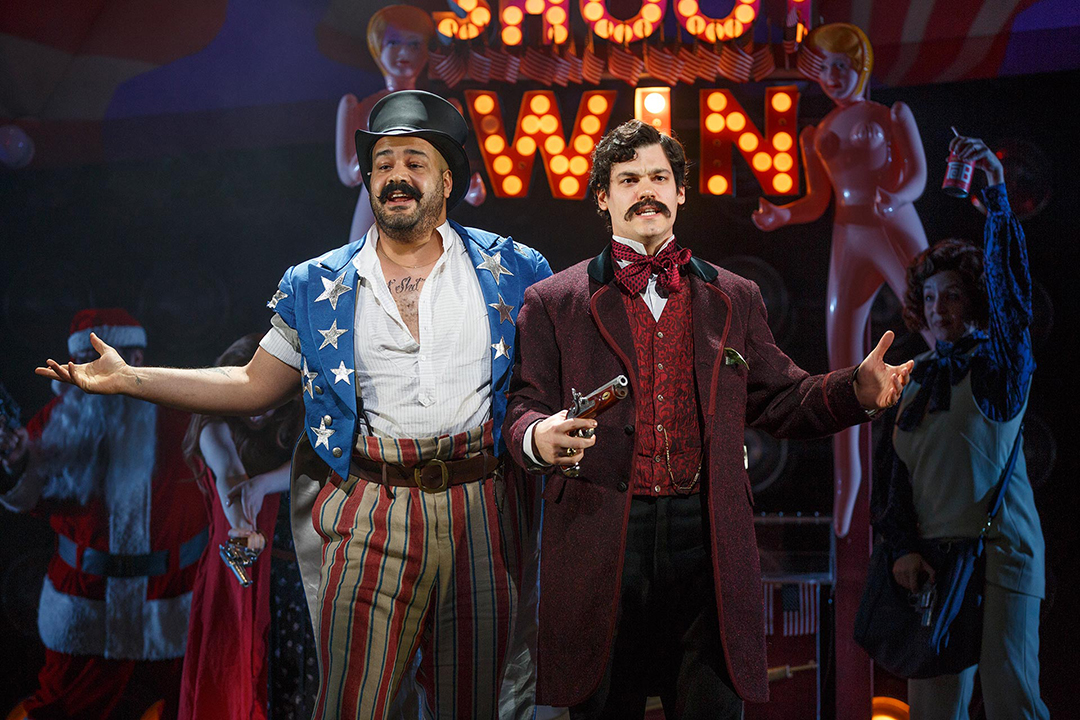
Courtesy of Carol Rosegg
James Bundy’s DRA ’95 new production of “Assassins” roils with a kind of corrosive mania. In a series of loosely connected songs and vignettes, John Weidman’s LAW ’74 book and Stephen Sondheim’s songs delve into the inner lives of nine of the 13 men and women who’ve attempted to assassinate a president of the United States. These disparate figures, separated by almost 140 years of history, are brought together by the mysterious Proprietor (Austin Durant). A strongman with a trans-temporal shooting range and the charisma of an evil P.T. Barnum, he urges his damaged protégés to achieve their dreams through high-profile political violence. The rest of the show’s connective tissue (and its only faint spark of hope) is provided by the Balladeer (Dylan Frederick), a dissonantly sincere Woody Guthrie/Pete Seeger-type who narrates three of the four successful assassinations in banjo-accompanied folk-pastiche numbers.
Sondheim’s score, ably performed by a 13-piece orchestra hidden behind the stage, draws heavily from different American musical traditions. “The Ballad of Guiteau,” split between Balladeer and the eponymous killer of President James Garfield (Stephen Derosa DRA ’95), is a standout success, switching maniacally between folk-revival and revival-tent hymn. (The song also showcases Sondheim’s attention to detail. Half the lyrics are taken from a poem written by the historical Guiteau, which he recited at his own execution while dancing to the accompaniment of a live orchestra). “Unworthy Of Your Love” is a pitch-perfect ’70s soft-rock hit, soulfully performed by John Hinckley (Lucas Dixon DRA ’12) and Lynnete “Squeaky” Fromme (Lauren Molina). Other references include barbershop quartets, Sousa marches, and 19th-century patriotic anthems, while the big ensemble numbers (“Everybodys’ Got The Right,” “Another National Anthem”) are more typical show-tunes. On the whole, the score surprisingly unified: every song is still distinctly Sondheim. The overall effect is something like a musical funhouse mirror of American history.
Weidman’s book is more hit-or-miss. His scenes are consistently witty and darkly satirical. A few are genuinely provocative. Even so, the plot is directionless and equivocal. Each individual vignette is effective, but they don’t build up to anything. Of course, this is in part a consequence of Sondheim’s diffuse score, and in part of the format, but the show has more structure than the typical review — enough that the lack of resolution feels unsatisfying.
The strong cast helps keep the more disjointed scenes compelling. Richard R. Henry gives an exceptionally strong performance as Samuel Byck, a garrulous unemployed tire salesman with plans to crash a plane into the Nixon White House. Squeaky Fromme and Sarah Jane Moore (Julia Murney) are enormously funny as a recurring comic-relief duo — the two actresses have excellent comic timing, and Murney’s nervous energy plays well against Molina’s strung-out languor. McKinley assassin Leon Czolgosz (P.J. Griffith) is angry and earnest, he’s especially compelling in a conversation with anarchist Emma Goldman (Liz Wisan DRA ’10). Stanley Bahorek is genuinely terrifying as Guiseppe Zangara (shot Roosevelt, missed), seething with nihilistic bitterness in his final moments in the electric chair. Derosa plays an eerily slick Guiteau, and Lucas Dixon is perfectly awkward and withdrawn as John Hinckley. Robert Lenzi, playing John Wilkes Booth, manages to invest his scenes with an air of genteel, concentrated menace. Frederick portrays the Balladeer with loose-limbed ease, simultaneously detached and sympathetic.
Riccardo Hernandez’s minimalist set emphasizes the characters’ toxic isolation. Practically the only things on stage are a massive, flag-patterned projection screen and a backdrop of old-fashioned camera flash bulbs — a reminder of the assassin’s consuming desire for recognition. One by one, we watch them spin out, lost to everything but their own fixations. The presidents on the screen above loom suitably larger than life, dominating the circumscribed world of the stage.
Taken as a group, the assassins are a colorful assortment of the lost, lonely and bitter. As the play progresses, their various motivations (social injustice, love, delusion, a persistent stomach complaint) start to cohere: these people haven’t just failed. They feel betrayed by a country that promised them success. The driving forces behind their megalomaniacal response to utter defeat — the obsession with fame, the seduction of gun violence — are unmistakably American. “Assassins” forces us to accept that these are our monsters. The disjunction between the show’s consistently jaunty tone and its sustained assault on American optimism is jarring. At its best, it’s brilliant, but not exactly pleasant to watch.







